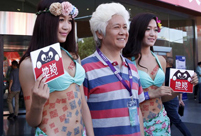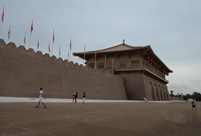 In pics: YOG prism
In pics: YOG prism
 Amputee girl reaches top of half-left tower in Jiangxi
Amputee girl reaches top of half-left tower in Jiangxi
 Yardangs in Lop Nur
Yardangs in Lop Nur
 Intoxicating Ayding Lake in Xinjiang
Intoxicating Ayding Lake in Xinjiang
 Beijing's MJ impersonator a 'thriller' for crowds
Beijing's MJ impersonator a 'thriller' for crowds
 Armed police compete on the plateau
Armed police compete on the plateau
 Rubber Duck settles in Guiyang new urban area
Rubber Duck settles in Guiyang new urban area
 Rare set of giant panda triplets turn one month old
Rare set of giant panda triplets turn one month old
 Closing ceremony of Youth Olympic Games
Closing ceremony of Youth Olympic Games
 Attractive posters to welcome freshmen
Attractive posters to welcome freshmen
Official suggests enterprises ensure their practices abide by the law
China's antitrust probes are not protectionist tools favoring domestic companies, an antitrust regulator said.
Domestic and foreign companies in China should review their operational to see if their practices fully abide by the Anti-Monopoly Law, said Xu Kunlin, director of the bureau of price supervision and anti-monopoly of the National Development and Reform Commission.
"Some business operators in China have failed to adjust their practices in accordance with the Anti-Monopoly Law," he said. "Others have a clear understanding of the law, but they take the chance that they may escape punishment."
Xu said any company that violates the law will be thoroughly investigated, regardless of its ownership structure or whether it is foreign-owned.
The NDRC has recently been in the spotlight for launching a series of anti-monopoly probes, many involving big foreign companies in China, such as US semiconductor maker Qualcomm and German automaker Audi.
The State Administration for Industry and Commerce, another major market regulator, said on Monday it has given Microsoft 20 days to reply to queries on the compatibility of its Windows operating system and Office software suite as part of an anti-monopoly investigation.
Xu said a key meeting of the Communist Party of China in November conveyed a clear message that China will attach greater importance to the role of market competition.
"As a major department for implementing the goal, the NDRC is determined to push forward antitrust enforcement," he said.
Xu said most of the anti-monopoly probes were initiated due to public reports and complaints. He said penalties vary not because the companies come from different countries, but mainly because of the severity of the violation and the company's actions and willingness to make changes.
Xu said the NDRC welcomed voluntary price cuts by some automakers involved in recent antitrust probes.
Many domestic companies have also been investigated for monopolistic practices, Xu said. In 2013, the department fined two premium liquor producers, Moutai and Wuliangye, for their conduct involving price fixing.
The same year, six baby formula makers were fined for price fixing and anti-competitive practices in August. Consumers would save an estimated 2.4 billion yuan ($388 million) a year after the baby formula makers concerned offered to cut prices by 5 to 20 percent following the probe, according to the department.
Xu said the highest fine was given to domestic milk powder company Biostime Inc, and those exempt from punishment include domestic and foreign producers.
"We believe the fairness of the law enforcement will be better reflected as the number of cases increases," he said.
Xu also said the NDRC will promote transparency of law enforcement and welcome supervision from the public and the companies under investigation.
The regulator respects all parties' rights to be heard and the right of defense, allowing them to seek judicial reviews of adverse decisions, he said.
Last month, the department cut the fines for Sumitomo Corp from 342 million yuan to 290 million yuan after a formal letter from the company.
Huang Yong, director of the center for competition law at the University of International Business and Economics, said most foreign companies have rich experience in addressing antitrust issues, but they need to gain a better understanding of China's antitrust law.
"Closer communication with Chinese regulators should be highlighted," Huang said.
The anti-monopoly law is enforced by three regulators in China: The Ministry of Commerce enforces merger provisions, the State Administration of Industry and Commerce focuses on non-price related actions and the NDRC takes on pricing monopoly.
Gao Yuan contributed to this story.
 Models with two-dimensional codes painted on bodies
Models with two-dimensional codes painted on bodies Antique exhibition of Maritime Silk Road held in Jinan
Antique exhibition of Maritime Silk Road held in Jinan NASA releases images of solar flare
NASA releases images of solar flare Daming Palace in Chang’an City in photos
Daming Palace in Chang’an City in photos Babies of celebrities born in the year of horse
Babies of celebrities born in the year of horse Farmer Painting, one of Ansai's Three Strange Wonders
Farmer Painting, one of Ansai's Three Strange Wonders Special holidays
Special holidays World's top 10 fighters
World's top 10 fighters 'Stewardesses' serve in hospital
'Stewardesses' serve in hospital The biggest duty-free store of the world
The biggest duty-free store of the world Volunteers bid farewell to YOG
Volunteers bid farewell to YOG More police dogs join anti-terror campaign in Inner Mongolia
More police dogs join anti-terror campaign in Inner Mongolia Picturesque Dayilan Manchu village in NE China
Picturesque Dayilan Manchu village in NE China Athletes experience the charm of Chinese traditional opera in Nanjing
Athletes experience the charm of Chinese traditional opera in Nanjing Contestants for Miss Bikini World experience Chinese traditional culture
Contestants for Miss Bikini World experience Chinese traditional cultureDay|Week|Month